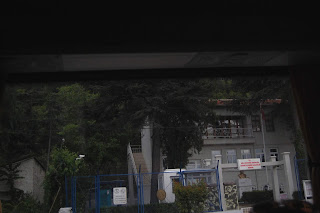The Kiosk
"Turkish Figures Before a Kiosk" by Count Amadeo Preziosi (1816-1882) The word kiosk traces its roots to the Turkish köşk , meaning villa or pavilion, via the Persian kuš . Fibreglass modular kiosks, known in Turkish as kulübe or kabin ("hut" or "cabin"), can be found everywhere in Turkey. But the highest concentration of kiosks is in Istanbul, their spiritual home. Kiosks can be found on almost every street corner, car park, bus station, hospital, park, military base and airport. They have a vast array of uses, beyond shelter for Turkey's legions of underemployed private security guards. They are tea huts, taxi dispatchers, car hire offices, workers' break rooms, ticket booths, convenience stores, fish sellers, sentry boxes and shoe repairers. The only limit is the imagination of the occupant. Huts are modular – with the "monoplex," representing a single unit big enough for a standing person – and can be conjo...









